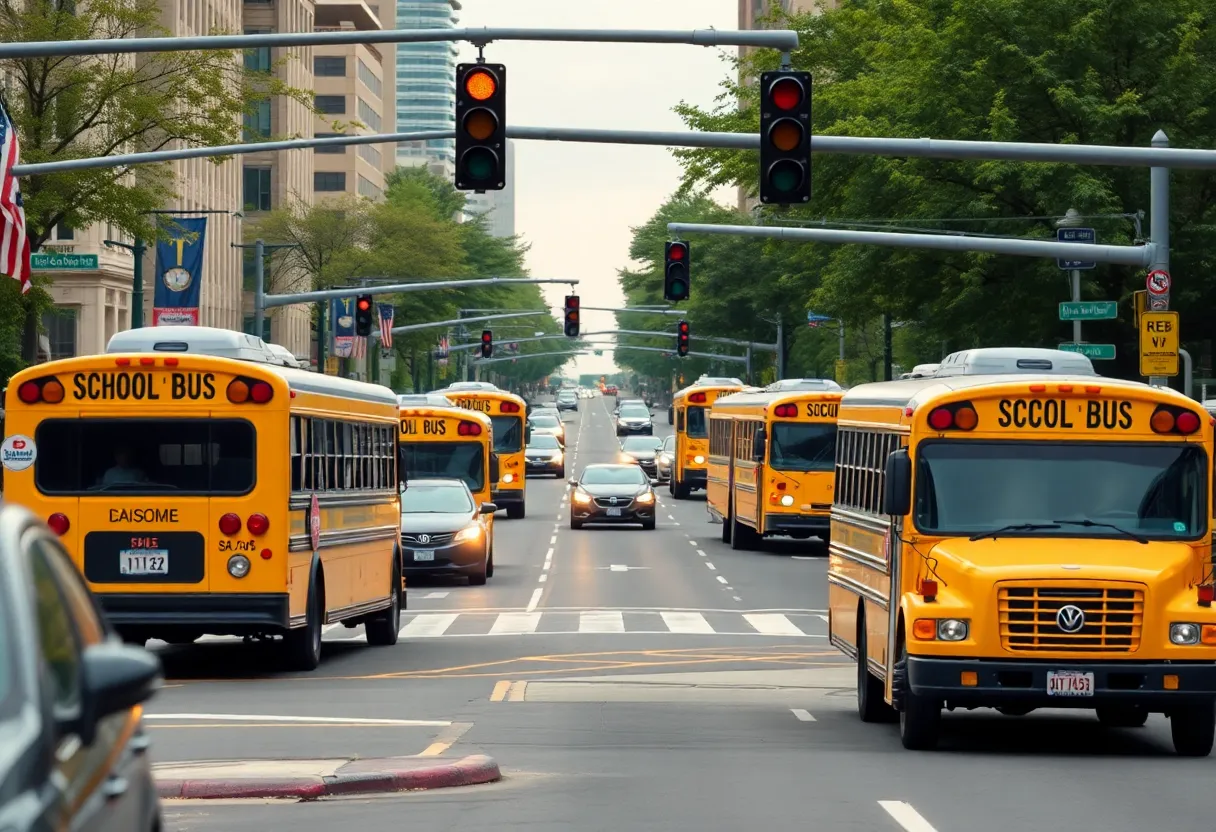News Summary
Boston is set to implement a pilot program featuring an automated AI traffic signal system to enhance the punctuality of school buses in the city. With over 20,000 students relying on 640 buses for daily commutes, the initiative aims to reduce tardiness and improve educational experiences by adjusting traffic light timings based on real-time conditions. Funded by a $50,000 grant from Bloomberg Philanthropies, this innovative approach seeks to shorten travel times and address ongoing challenges in school transportation, while also integrating enhanced safety measures.
Boston is set to implement a pilot program utilizing an automated AI traffic signal system aimed at improving the punctuality of school buses navigating the city’s congested streets. The initiative comes in response to persistent challenges with late buses serving Boston Public Schools (BPS), which can hinder students’ educational experiences. The AI system will adjust traffic light timing based on real-time conditions rather than relying on fixed timers, allowing for shorter stops at red lights or extended green lights for school buses.
The primary objective is to enhance the on-time arrival of students, thereby reducing tardiness and contributing positively to their educational outcomes. Boston city officials believe that minimizing bus travel time will afford students more opportunities for learning at school and provide ample time for rest at home. Currently, the Boston school district operates 640 buses catering to over 20,000 students, making approximately 3,000 runs daily that include more than 10,000 stops.
Implementation and Funding
The pilot program is scheduled to begin in the upcoming school year and has received financial support through a $50,000 grant from Bloomberg Philanthropies as part of their 2025 Mayors Challenge. Boston is one of 50 cities worldwide to receive this grant, with the potential for 25 cities to secure additional funding of $1 million each in January 2024 to aid in their respective projects. This marks a significant step as it represents the first instance where a city as large as Boston will specifically utilize AI technology to optimize school bus travel times.
Previous Efforts and Expectations
Last year, an initial trial was conducted in collaboration with the Massachusetts Bay Transportation Authority (MBTA) on two public transit bus routes along Brighton Avenue. Experience from this project highlighted the potential advantages of AI systems; in similar implementations in other cities like Portland, Oregon, AI technologies have shown the ability to significantly reduce travel times, with a nine-mile bus route experiencing a decrease in trip duration by approximately six minutes.
Experts believe that if successfully implemented, this initiative could lead to shortened travel times for every bus trip, bolstering reliability in the school transportation system. A previous improvement plan aimed at achieving a 95% on-time service rate within three years concluded with a rate of 94%, suggesting ongoing efforts to enhance performance are yielding results.
Challenges and Considerations
However, experts also caution that AI technology may not be a singular solution to all transportation issues, particularly when faced with significant traffic delays or physical obstacles obstructing routes. To address various challenges, this AI approach will need to be combined with other traffic management strategies, including the implementation of dedicated bus lanes and adjustments to school schedules.
Boston city officials are aiming for an 8% reduction in school bus travel times in areas that are particularly prone to delays. Data collected from buses equipped with GPS technology will enable the traffic management center to optimize the timing of traffic signals, thereby improving the flow of traffic for school buses.
Community Impact
Parents and community members express optimism regarding the potential benefits of this new technology, with the hope that it will lead to improved traffic management across the city and positively impact school communities. Enhanced safety measures will also be integrated, allowing engineers to override the AI system when necessary to ensure the protection of students and other road users.
As Boston embarks on this innovative venture, the pilot program represents a significant commitment to improving the reliability of school transportation and ensuring that students arrive at school on time, ready to learn. The application of AI in public school transportation is positioned as a forward-thinking solution, with the potential for long-term benefits for students and the broader community.
Deeper Dive: News & Info About This Topic
HERE Resources
Boston City Council Forms Commission to Tackle Office Vacancies
Bipartisan Discussion in Boston Tackles Key Issues
Boston Police Seek Suspect in Traffic Light Vandalism
Sigue Corp. Shuts Down Amid Missing Customer Funds
New Costco Opens in Sharon, Massachusetts
Costco Grand Opening Set for Sharon, Massachusetts
Leadership Change at McKinsey & Company in Greater China
Additional Resources
- Boston Globe: BPS AI School Bus Traffic Lights
- Wikipedia: Artificial Intelligence
- MassLive: MBTA Using AI to Speed Up Bus Travel
- Google Search: AI in Public Transportation
- Smart Cities Dive: AI in Public Transit
- Google Scholar: AI Traffic Signals
- GovTech: GPS and AI Technology for Buses
- Encyclopedia Britannica: Traffic Management
- NBC Boston: Can AI Solve Boston’s Traffic Problems?
- Google News: Boston School Bus AI

Author: STAFF HERE BOSTON WRITER
The BOSTON STAFF WRITER represents the experienced team at HEREBoston.com, your go-to source for actionable local news and information in Boston, Suffolk County, and beyond. Specializing in "news you can use," we cover essential topics like product reviews for personal and business needs, local business directories, politics, real estate trends, neighborhood insights, and state news affecting the area—with deep expertise drawn from years of dedicated reporting and strong community input, including local press releases and business updates. We deliver top reporting on high-value events such as Boston Marathon, Head of the Charles Regatta, and Boston Harborfest. Our coverage extends to key organizations like the Greater Boston Chamber of Commerce and Associated Industries of Massachusetts, plus leading businesses in finance, biotech, and insurance that power the local economy such as Fidelity Investments, Biogen, and Liberty Mutual Insurance. As part of the broader HERE network, we provide comprehensive, credible insights into Massachusetts's dynamic landscape.



